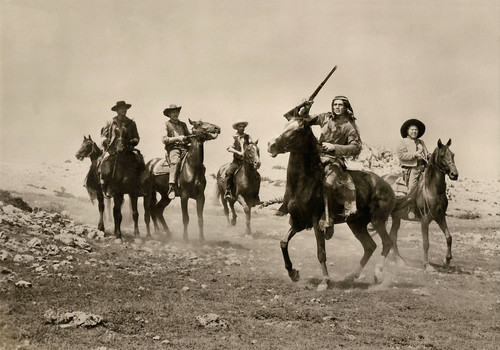
East-German postcard by VEB Progress Film-Verleih, Berlin, no. 89/69. Photo: DEFA / Rambo. Gojko Mitic in Weisse Wölfe/White Wolves (Konrad Petzold, Bosko Boskovic, 1969).

East-German postcard by VEB Progress Film-Vertrieb, Berlin, no. 29/70. Photo: DEFA. Rolf Hoppe in Weisse Wölfe/White Wolves (Konrad Petzold, Bosko Boskovic, 1969).

East-German card by VEB Progress Film-Vertrieb, Berlin, no. 53/69, 1969. Retail price: 0,20 MDN. Photo: DEFA / Rambo. Barbara Brylska in Weisse Wölfe/White Wolves (Bosko Boskovic, Konrad Petzold, 1969).

East-German postcard by VEB Progress Film-Vertrieb, Berlin, no. 56/69. Photo: DEFA / Rambo. Rolf Hoppe in Weisse Wölfe/White Wolves (Konrad Petzold, Bosko Boskovic, 1969).
The Shooting of Chief Farseeing Hawk
A group of four Dakota Indians led by Chief Farseeing Hawk (Gojko Mitic), travels through the Black Hills in winter. They want to join the Cheyenne tribal group under Chief Little Wolf who has fled their Indian reservation.
At the same time, the transport of trader Sam Blake (Helmut Schreiber) arrives at Fort Robinson. Blake has the gold trade in the Black Hills in his hands, which prevents Harrington (Horst Schulze), a mining boss travelling with them, from expanding his business. Blake also transports the money for the mining company GMI.
In order to get Blake into payment difficulties, Bashan's gang robs the cash transports several times. Bashan (Rolf Hoppe) is the head of the gold mine's guard and acts on Harrington's behalf. On his way back from a robbery, he shoots Blue Hair (Lali Meschi), the chief's wife. Falcon unsuccessfully tries to kill Bashan at the mine.
Due to these events, Harrington enforces the appointment of his employee Sleek (Karl Zugowski) as the deputy sheriff. The sheriff is the former prospector Pat Patterson (Holger Mahlich). Together with Peter Hille (Fred Delmare), he wants to keep law and order in Tanglewood. When Patterson himself runs a money transport, Bashan takes control of Tanglewood with Sleek's help.
Now Harrington can easily put pressure on Blake and demand payment of the looted funds. Meanwhile, Hille finds out that Harrington himself is behind the robberies. When Bashan also wants to rob Patterson of the money, Falcon comes to his aid and the robbery fails. Together they ride to Tanglewood and barricade themselves in the sheriff's office.
Patterson, however, is no longer able to take action against Harrington because Blake has defected to Harrington and the justice of the peace is being held by Harrington's men. Farseeing Hawk is able to leave the office and kill his wife's murderer but is shot himself in the process.

East-German card by VEB Progress Film-Vertrieb, Berlin, no. 89/69, 1969. Retail price: 0,20 MDN. Photo: DEFA / Rambo. Scene from Weisse Wölfe/White Wolves (Bosko Boskovic, Konrad Petzold, 1969).

East-German postcard by VEB Progress Film-Vertrieb, Berlin, no. 118/69, 1969. Retail price: 0,20 MDN. Photo: Bläsig. Gojko Mitic in Weisse Wölfe/White Wolves (Bosko Boskovic, Konrad Petzold, 1969).

East-German card by VEB Progress Film-Vertrieb, Berlin, no. 130/69, 1969. Retail price: 0,20 MDN. Photo: DEFA. Holger Mahlich and Karl Zugowksi in Weisse Wölfe/White Wolves (Bosko Boskovic, Konrad Petzold, 1969).

East-German postcard by VEB Progress Film-Vertrieb, Berlin, no. 132/69, 1969. Retail price: 0,20 MDN. Photo: DEFA / Rambo. Fred Delmare, Holger Mahlich and Karl Zugowksi in Weisse Wölfe/White Wolves (Bosko Boskovic, Konrad Petzold, 1969).
The breakout of the Cheyenne from their reservation
Weisse Wölfe/White Wolves (1969) is the sequel to Spur des Falken/Trail of the Falcon (Gottfried Kolditz, 1968). The 'Ostern', an Eastern-German sub-genre of Western, depicts the situation in the USA after 1879. Power struggles between newly founded companies are characteristic of this period.
Historically documented is the breakout of the Cheyenne from their reservation. Weisse Wölfe tells its story in a much darker mood than contemporary Karl-May films of the West German cinema, showing at the beginning how the natives are forced to go into reservations and struggle for survival, an attempt which seems doomed.
The dramatic music of the film, often led by powerful brass instruments, does well to enhance its effect. Filming took place in the High Tatras in former Yugoslavia, in the Dinaric Mountains, in a limestone quarry near Halle and near Langerwisch.
The majority of the 'Easterns' by DEFA studio, was filmed in Yugoslavia, where nature is very similar to North America with Mountains, prairies, rivers, waterfalls, and typical towns of the Wild West. The buildings of the film town of Tanglewood near Langerwisch had to be guarded because the mahogany wood used could also be used to build dachas.
In addition to the Serbian Gojko Mitić, Polish Barbara Brylska, Czech Milan Jablonský, Serbian Slobodan Dimitrijević and Serbian Slobodan Velimirović, the cast includes such DEFA stars as Horst Schulze, Holger Mahlich, Fred Delmare, Rolf Hoppe and Karl Zugowski from East-Germany.

East-German postcard by VEB Progress Film-Vertrieb, Berlin, no. 152/69, 1969. Retail price: 0,20 MDN. Photo: DEFA / Rambo. Fred Delmare in Weisse Wölfe/White Wolves (Bosko Boskovic, Konrad Petzold, 1969).

East-German card by VEB Progress Film-Vertrieb, Berlin, no. 188/69, 1969. Retail price: 0,20 MDN. Photo: DEFA / Rambo. Barbara Brylska and Fred Ludwig in Weisse Wölfe/White Wolves (Bosko Boskovic, Konrad Petzold, 1969).

Large East-German card by VEB Progress Film-Vertrieb, Berlin, no. 209/69, 1969. Retail price: 0,40 MDN. Photo: DEFA. Holger Mahlich in Weisse Wölfe/White Wolves (Bosko Boskovic, Konrad Petzold, 1969).

East-German postcard by VEB Progress Film-Verleih, Berlin, no. 8/76. Photo: DEFA / Rambo(w). Milan Jablonsky, Karl Zugowski and Holger Mahlich in Weisse Wölfe/White Wolves (Konrad Petzold, Bosko Boskovic, 1969). Caption: Blauhaar, Hawk's wife, has been shot by the Mining Corporation's bandit chief. Together with the incorruptible Sheriff Patterson, the chief comes to Tanglewood to atone for the crime. In the meantime, the white man's economic power struggle in the town has clearly gone in favour of the mining boss Harrington. There is no way back for Hawk.
Sources: Wikipedia (English and German), and IMDb.
No comments:
Post a Comment